'Nathan Burgoine's Blog, page 109
July 3, 2016
Sunday Shorts – “Men in Love” Q&A with Gregg Shapiro
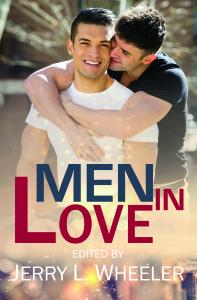 Today I’m sitting down with Gregg Shapiro, another one of the many wonderful authors I’ve “met” through sharing a table of contents in Men in Love. I broached whether or not he’d be willing to visit my little corner in the short fiction world, and he was kind enough to chat with me about his piece.
Today I’m sitting down with Gregg Shapiro, another one of the many wonderful authors I’ve “met” through sharing a table of contents in Men in Love. I broached whether or not he’d be willing to visit my little corner in the short fiction world, and he was kind enough to chat with me about his piece.
Spring approaches with the promise of new beginnings, fresh adventures, and the thrill of romance rekindled or discovered. Hot, sexy guys abound—meeting on the ball fields or the boardroom, at the theater or the classroom—falling in love and lust for the first time or celebrating a lifetime. Come join the rites of spring and indulge yourself in the passion and pleasures of our luscious men in love. Stories from some of today’s popular m/m romance authors explore the many faces of men in love: gay for you, seductions, weddings and more.
NB: Hello, and welcome! First off, can you tell us a bit about your story in Men in Love?
GS: “6th & E” is set in the NE section of Capitol Hill in Washington DC during the mid-to-late 1980s. I lived in the neighbourhood at that time and it was still a bit edgy; bars on windows, etc. This was before the remodel of Union Station, which transformed the decrepit building and train terminal into a bustling mall and destination, was complete. The story is ultimately about flirtation and fidelity.
NB: I really enjoyed it—it wasn’t a “typical” story expected in a romance anthology (which is absolutely both a compliment to you and your writing as well as to the anthology as a whole, which really surpassed my expectations). When it comes to romance (be that as a writer or a reader), what’s something you always hope to find?
GS: Humor. I want to laugh and I want to be able to make readers laugh. Romance has to have a sense of humor.
NB: Yes! And, let’s be honest, love is funny. Y’know, when it’s not soul-crushing. Lastly, if you could submit to an anthology with any theme you’d like, what would it be? You’ve written a collection of Chicago stories, and How to Whistle just launched. What theme would you like to explore?
GS: Geography and place figure prominently in my work. The stories in Lincoln Avenue all take place in and around Chicago. The stories in How to Whistle are set in Chicago, Boston and Washington DC (three cities in which I’ve lived). I now live in South Florida which has begun to work its way into my fiction and poetry. I had a poem in Full Moon on K Street, an anthology of poetry about Washington DC edited by Kim Roberts and a poem in Windy City Queer, anthology of queer writers writing about Chicago. I suppose I’d like to submit work to place-related anthologies about Boston and Wilton Manors/Fort Lauderdale.
NB: It occurs to me that other than perhaps a collection about New Orleans, I’ve never read one devoted to a place before. I’m adding that to my list. Thank you!
If you want to snag a copy of Men in Love for yourself, you can get it directly from the publisher, Bold Strokes Books, here. Otherwise, you can always use Indiebound to look for your closest brick-and-mortar, or visit any store where quality LGBT books are sold.
Entertainment journalist Gregg Shapiro is the author of Lincoln Avenue (Squares and Rebel Press), GREGG SHAPIRO: 77 (Souvenir Spoon Press), Protection (Gival Press) and How to Whistle (Lethe Press). His interviews and reviews run in a variety of regional LGBT and mainstream publications and websites. He is the co-winner of Seven Kitchens Press’s Robin Becker Chapbook Prize, and his chapbook, Fifty Degrees, was released in May 2016. Sapiro lives in Fort Lauderdale, Florida, with his husband Rick Karlin and their dog k.d.


July 1, 2016
Crazy? Check. Canuck? Working on that. Definitely Hopping Though!

Something a bit different this week for me. I’m taking part in a Canadian blog-hop, along side some awesome Canucklehead authors (a couple of which I’ve had the pleasure of meeting through Romancing the Capital). There are prizes. There are blogs. Also hops. Wait. No. That sounds like beer. There’s hopping. You can remain seated, though. I am assured the hopping part is virtual.
But it’s all about the romance, all about the Canada, and definitely all about the crazy.
Now, if you’ve been following along at home, you know I’m almost Canadian. I’ve been living in Canada as a permanent landed immigrant for mumble-mumble years, and after I married my fella, and got my surname legally changed to match his (let me tell you, that’s a whole extra ball of fun when you have to explain over and over that yes, usually that’s what the wife does, and no, there’s no wife in this marriage, ha-ha, yes, now you get it, wasn’t that awkward?) and gathered all my newly minted ID, and then started the process of citizenship.
I’ve since passed the test (also not a walk in the park, by the way) and now I’m just waiting to swear my oath. Then it’ll be official.
But my tangling with red-maple-leaf tape isn’t why you’re here.
Why Canadian?
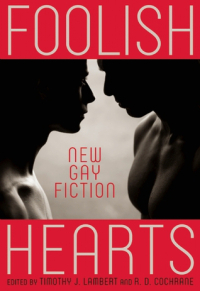
My romance short story “Struck” takes place mostly at the Rideau Centre, including spending some time in the awesome park on the roof.
I love romance, and I love Canada, and as such the two often end up together in my stories. Almost everything I’ve ever written has taken place in Canada (usually here in Ottawa, where I live, or otherwise in British Columbia, where I spent quite a bit of time in my high school days). There are a couple of reasons for that, but first and foremost is as a writer, I do want to get things right.
I’m fairly likely to get the details right when I’m talking about Ottawa. I’ve spent more than half my life here (a feat I never thought I’d ever be able to say about anywhere, but that’s my nomadic childhood speaking up). More, it’s kind of liberating to head down to the NCC hosted kiosks and ask things like, “So, tell me about the Grand Trunk railway station, would you?” It’s always fun to talk to people who love their job, love their history, and love their city.
And I do love mine.
But it’s more than that. Given that I write queer romance, the setting has an extra layer of details to worry about. For example, I married my husband ten years ago (I proposed the day the Federal law changed in Canada). The US just had the one year anniversary of the Federal legalization of queer marriage. There are a million little differences that were in play during the time where my marriage was legal up here—but not down there—that could throw a wrench in a narrative set on the wrong side of the border.
I think it was my writer friend Greg Herren talking about New Orleans who said, “There are things that happen here that could only happen here.” I feel that way about setting my stores in Canada. The setting is often as much a character as anything else.
Why Queer?
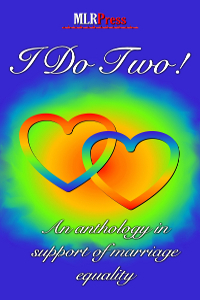
“Cakewalk” is about a guy who is unexpectedly looking after his boyfriend’s tween daughter. It appeared in I Do Two!, from MLR Press.
The short answer? Because we deserve some happy-ever-afters.
The long answer? I write queer characters (and especially when I write romance, I write queer romance) because representation matters. Visibility matters. Seeing stories that involve people like yourself matters. When I was a queerling, mumble-mumble years ago, there was nothing I could find. I don’t doubt things existed, but the access and the presence of those things were zilch, which meant they basically didn’t.
And the first darn thing I did find with a gay character was a story I had to study in an English class, and the queer character died and the general consensus of the story, the teacher, and the class was ‘Well, that’s what happens.’
Imagine for a sec the first time you saw a character that was someone you could connect with on a deep and visceral level died and everyone around you shrugged and said, ‘Of course.’
Yeah. That sucked.
I write the queer romance characters I write because I want queerlings to find themselves in the pages of books with futures and romances and happy-ever-afters. I once got a letter from a closeted kid in small-town Illinois who’d read a short story I’d written, “Cakewalk,” and his message to me—that this was the first time he’d read a story with a gay couple who had a kid and were a family and it was all just so possible—had me sobbing on the bus.
Understand, we’re not talking “Wow, that man is moved” sobs. We’re talking full on snot-bubble blotchy-faced ugliness on the freaking 97 South Keys bus. People moved away from me, and did so with alarm. I looked unhinged.
That one e-mail is worth more than any review I’ve ever gotten, the nominations for awards, and anything else.
It also taught me not to read reader feedback in public.
Why Crazy?
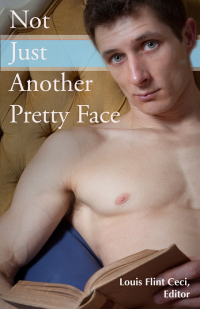
In “Bound,” (included in the anthology Not Just Another Pretty Face), I have a guy who sees the future fall for a werewolf from the wrong side of the tracks.
I love to laugh. The reality of being a queer guy (and, let’s be frank, I’m a white cis-gendered queer guy, so I walk with a very full backpack of privilege) is not always fantastic. There are—no lie—daily reminders that people would rather I not exist. My response to that struggle is, and has always been, to try to laugh as much as possible. Find the joy. Find the happiness. Spread that stuff around like it’s oxygen.
I generally write on the spec-fic side of the street, even when I’m writing romances. I love a dash of the unreal, or the magic, or the psychic, and part of that is how easily those things align with the reality of being a queer guy. We’re already uncommon. We’re the opposite of what’s assumed and expected. So why not take that and run with it?
All that generally combines into a magical (or psychic) world where people come face-to-face with situations that are a bit “out there.” In Light, I’ve got a gay guy trying to enjoy pride week who just happens to be telepathic and telekinetic (though he’s not very good at either, to be honest) and I hope that readers spend as much time chuckling as they do getting wrapped up in his struggle to save pride from a very dangerous foe. Also, he starts dating a yummy French Canadian leather man, because he doesn’t have enough on his plate.
In my various stories, I’ve got a psychometrist who writes history books, a psychokinetic quasi-superhero, a physical trainer who can heal, a town in B.C. with a population partly descended from naiads, a guy who can talk to the dead, someone who can see the past, a telepath or two, and even a bottle of magic ice wine. Falling in love is tricky. Falling in love when you’re psychic?
Crazy.
And I wouldn’t have it any other way.
Wait, you said “prizes…”
I did! Well spotted.
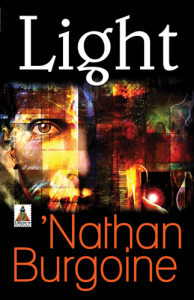
I’m giving away a copy of Light. It’s about a gay telepathic psychokinetic trying to save Pride and maybe get a date with a hunky leather man.
Okay, each stop on the blog hop has an individual prize, and then there’s a grand-prize, to boot.
This means there are eight chances to win various prizes, and then a ninth chance to win the grand prize (a $50 Amazon or Chapters/Indigo e-Gift Certificate). To enter for the grand prize, you’ll want to visit this link to Rafflecopter (note: Rafflecopter is not, in fact, a Transformer with a gambling problem. I asked.)
For the individual prizes you’ll need to visit the blogs and follow the individual instructions. For a copy of Light, the prize I’m giving away, all you need to do is comment here, or on my author Facebook page where this post will be referenced. I’ll connect with the winner to figure out how to mail said winning prize, so make sure you leave e-mail notifications on for replies to any comment you leave, or check back to see if you won on the 9th of July.
What should you comment? Any of the following:
Why you love Canada (The hotness of our Prime Minister is a valid option).
Why you love Romance (Queer or otherwise).
Why you love Crazy (Please specify the crazy in question).
That’ll enter you into my contest. But don’t forget the other seven blogs!
Which blogs? What prizes? (This list also available through that Froggy button):
PD Workman – Summer is Short on the Prairies Canadiana Prize Pack, including paperback copy of Questing for a Dream
Jessica Subject – a paperback copy of Alien Next Door – the Complete Series
Romarin Demetri – A Mirror Among Shattered Glass
Lisa Emme – a signed copy of Home Again
Julie Coulter Bellon – Book Lover’s Basket, including autographed copies of The Captiveand The Captain
Nathan Burgoine – a copy of Light
Kayleigh Malcolm – $20 CAD Amazon Gift Card
Cori Vidae – a paperback copy of Rough Edges
And, finally, huge thank you to Lisa Emme for organizing this blog-hop and being so over-all cool in general.


June 30, 2016
#ThrowBookThursday – The Night We Met by Rob Byrnes
I bumped into this hashtag on a virtual book club, and I loved it. The notion is instead of a Throwback Thursday photograph (which, like many queerfolk who were kicked to the curb, I don’t have beyond a certain date), you post a book you loved from back when. You all know how I feel about book reviews and bringing attention to missed gems, so…
The Night We Met, Rob Byrnes
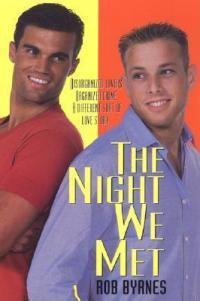 There’s a whole story about reading this book that I love to tell. Basically, The Night We Met dropped perfectly into my lap at a time when I truly needed it. I’d been dumped by my works-in-finance older boyfriend (and replaced by a blonder model), I’d struggled to find a new place to live with zero notice, and although I loved my job in the book industry, I was coming home to a tiny empty apartment every night (I hadn’t managed to afford a bed yet) and things were beyond tight.
There’s a whole story about reading this book that I love to tell. Basically, The Night We Met dropped perfectly into my lap at a time when I truly needed it. I’d been dumped by my works-in-finance older boyfriend (and replaced by a blonder model), I’d struggled to find a new place to live with zero notice, and although I loved my job in the book industry, I was coming home to a tiny empty apartment every night (I hadn’t managed to afford a bed yet) and things were beyond tight.
Then, I opened a box at work one day while doing stock, and there was this book. The cover made me do a double-take: wait, are those two guys smiling at each other like… y’know?
I read the back flap, and blinked in surprise. Yep. It looked like I’d actually just found a gay romantic comedy. Woah. So, I bought it with my store credit (we used to earn rewards for working above-and-beyond, and I hoarded my points to trade into gift certificates to buy books with), and I started reading it on my break, where people kept asking me what I was reading because I was laughing so hard.
I read it on the bus-ride home, even though that makes me feel a little motion sick (and people stared because I laughed so loud). And I decided that, damn it, I deserved a treat and I went to the pizza place across from where I lived in my tiny empty apartment and I had dinner while I read.
They kicked me out for laughing too loud, so I took my remaining pizza home with me kept reading.
I finished the book sometime in the wee hours of the morning, wrote a barely coherent review on Amazon, and collapsed into one of the best sleeps I’d had in years. It was the perfectly timed book: it reminded me that no matter how low I got, I needed to laugh, and the eerie parallels certainly helped: the main character of the book works in the book industry and gets dumped by his older boyfriend (who works in finance) for a blonder model right off the bat.
Mind you, I never fell for the son of a mafia boss after that, but a guy could dream.
The story is witty and reads like a cross between a mad-cap zany caper and a rom-com, and the result was gold. Picture a book editor, Andrew, recently (and not willingly) single and gay, whose ex just picked up something younger and cuter. Andrew’s first two books are on the bargain bin, he’s feeling pretty down, and then at an opening party for a new gay bar on Hallowe’en, he meets the man of his dreams, the man who could just maybe be, Mr. Right.
If Mr. Right was a quasi-heterosexual son of one of the worst Mafia Capo bosses in the city, and if Andrew could be sure that Mr. Right didn’t just mistake his Hallowe’en costume (a drag outfit) for Andrew himself being a woman…
The bon-mots are fabulous, the plot is so outrageous that it has a Evanovich-esque slaptstick to it that just totally leaves you gasping for air between guffaws. And beyond it all, there’s Andrew, hopeless (and hopeful) romantic, dodging thugs, police, FBI, his best friends, and once or twice having nookie that will curl your toes.
Phenom. And from this book onward, every time Byrnes put out a book, I nabbed them immediately.


June 26, 2016
Sunday Shorts – “Not Just Another Pretty Face” Q&A with Erik Schuckers
One of the things about Not Just Another Pretty Face that I’ve loved is the mix of forms. Poetry, fiction, essays and a play, all sparked by images, all in one volume. I’ve been loving connecting with the authors about their inspiration drawn from photographs, and I have to say that Erik Schuckers—who I’m speaking with today—moved me completely.
 The stories, poems, and essays in this collection have a single element in common that unites their wide range of literary styles and genres: they all spring directly from photographs of go-go boys.
The stories, poems, and essays in this collection have a single element in common that unites their wide range of literary styles and genres: they all spring directly from photographs of go-go boys.
The ideal go-go boy is the perfect erotic object. We may imagine him as lost or broken so that we might rescue him, or as potent and aggressive so we might be the focus of his desire. But the images captured here suggest deeper, more complex realities. These dancers are whimsical, haunting, satiric, playful, ominous. They are not icons, but stories waiting to be told.
Twenty-three photos of male go-go dancers become the basis for stories, poems, essays, and drama by twenty-seven authors, revealing unexpected mysteries, romance, fantasy, and humor. Contributors include 2015 Sue Kaufman Prize winner Michael Carroll, 2013 Lambda Mid-Career author Trebor Healey, and Lammy winners Jeff Mann, David Pratt, and Jim Provenzano.
NB: Not Just Another Pretty Face has a unique approach in that it asked the contributors to work from the inspiration of a photograph. Was that a new process for you? Did it spark a narrative you were expecting?
ES: I’ve had some experience with ekphrastic poetry, including a workshop last year where a bunch of us worked from photos by the great Duane Michals. And I love the process of looking deeply at a photo and imagining my way into (or out of) it. But I totally wasn’t expecting to write what I did for NJAPF.
One photo just floored me. (I later found out it did the same for Alan Martinez, whose beautiful heart-sore poem is included, and for the editor, Louis Flint Ceci, who cited it as the photo that got him thinking the anthology was possible.) The model’s eyes, his posture, the defensive way he holds one arm…. It instantly called back memories of an unusually complicated and painful relationship.
James and I fell in love in college. We were together for about seven years, and for some of that time he worked as a go-go dancer in a Pittsburgh bar. After we split up, I fled to England, and when I came back a few years later, we mostly avoided each other. Eventually, in 2013, he sent me a message on Facebook. He’d been diagnosed with cancer. We met for lunch, and started talking again, and suddenly we were back in each others’ lives.
He died in 2015, just a couple of months before I saw that photo for NJAPF. I started “Summer: A History” expecting it to be a poem, but it quickly started to cross time zones and turn itself into something else. Like Little Edie, I was finding it very difficult to keep the line between the past and the present, and that sort of dictated the form of what turned out to be a really long (by my standards) essay.
I had no intention of delving quite so frankly into the topics I did when I started writing: addiction, jealousy, the cruelty of religion, the pernicious divides of class. Some of what I wrote surprised me. But I was grateful that it did.
NB: It was a truly moving piece, and I’m glad to have read it. It’s rare to find a collection with short fiction, a play, photography and poetry in one volume. I’m very much a short fiction writer, who fights my way to novellas and novels. Do you find a particular form speaks to you more than others?
ES: One of the things that’s really special about NJAPF is the eclecticism of its contents: all kinds of different forms rub up against each other, and the result is really a kind of celebration. Until recently, most of what I’ve written has been poetry: it’s the form I think most naturally in. I love fiction, of every length, and read at least as much of it as poetry – more, if you factor in my affinity for trashy ’70s-’80s paperback horror and classic English whodunnits. But I haven’t been able to write a decent story yet. (Indecent ones are another matter.)
NB: There’s a pretty wide market for indecent stories, mind.
ES: Creative nonfiction is new territory for me, and I love that this photo and this anthology spurred me to write something outside my comfort zone, to try something new. It was a challenge, for sure, and I still find myself wishing I’d switched that section around to there, or cut that adverb and used a better verb instead, but it was a huge relief to stop worrying about line breaks for a little while.
NB: Poetry has always sat outside my reach. I’m in awe of you poets. Now, I’ve been asking everyone this one: if you could have your dream anthology call to write for, what would be the theme?
ES: As for anthologies I’d love to write for…? I already have poems that feature Karen Black, Ronee Blakley, Jamie Lee Curtis, and Daria Nicolodi, so I’m totally set for a cult horror divas of the 1970s and ’80s collection. Or maybe a version of Spoon River Anthology set in Twin Peaks? I think I could write a mean persona poem as Nadine Hurley.
I could riff on this all night…
NB: I’m pretty sure I’d stay up all night reading them, too. Thank you!
You can get Not Just Another Pretty Face through Beautiful Dreamer Press, here. Or, of course, you can check your local brick and mortar (try Indiebound, which lists Not Just Another Pretty Face and helps you track down your local store). And, of course, the collection is available online and wherever quality LGBT books are sold.
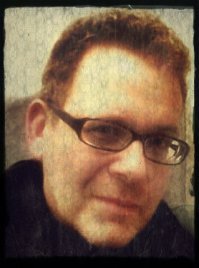
Erik Schuckers studied writing at Allegheny College and the University of Sheffield. He picked apples, cleaned theaters, and sold books in the US and UK before moving into nonprofit work.
His work has appeared or is forthcoming in Assaracus, PANK, Clockhouse, The James Franco Review, and as part of the HIV Here & Now Project.
He lives in Pittsburgh, and you can reach him here.


June 23, 2016
#ThrowBookThursday – The Affair of the Porcelain Dog by Jess Faraday
I bumped into this hashtag on a virtual book club, and I loved it. The notion is instead of a Throwback Thursday photograph (which, like many queerfolk who were kicked to the curb, I don’t have beyond a certain date), you post a book you loved from back when. You all know how I feel about book reviews and bringing attention to missed gems, so…
With no further ado, first up a book released five years ago this month, from Jess Faraday.
The Affair of the Porcelain Dog, Jess Faraday
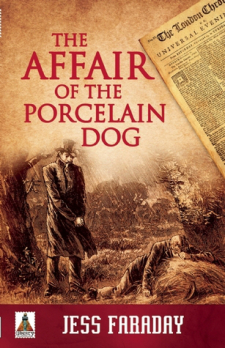
Released five years ago in paperback, I listened to this book and fell instantly in love with the characters.
My review from 2013:
I’m a lover of audiobooks. Even if I were able to physically read on the bus – I can’t, it makes me feel ill – there’s still something so incredibly wonderful about the spoken word, and the experience of listening to a great story being told. Usually, I do this to make the time pass by on the long trek to and from work, or when I’m doing something tedious like the laundry or dishes. For “The Affair of the Porcelain Dog” I was instead scurrying around, trying to find any excuse to be able to keep listening, and even wearing my ear-buds while I did routine stuff all the way to the moment I had to open the doors for the day.
I listened on my break. I listened on my lunch. I listened in the bath. I even got up early on the day of my closing shift so I’d have the two full hours of time I needed to finish the book before my work shift started.
In short? Jess Faraday’s “The Affair of the Porcelain Dog” was the best audiobook experience I’ve had in years. There are a few sides to that experience.
One, the writing was so completely engaging that I was happily drawn into the narrative from step one. The setting – a Holmes-era tale in London at it’s most coal-caked and financially stratified, “The Affair of the Porcelain Dog” is also Holmes-esque in its execution, pulling you into a mystery from the opening that is as steeped in the time and place and culture as it is in the richly drawn characters. The main voice, Ira Adler, is such a charming character even when he’s being selfish or spoiled that I was smitten instantly. An orphan and former rent-boy, Ira is living in luxury now at the beck and call – and bed – of Cain Goddard, who despite his genteel appearance is in fact a crime lord making most of his living off the legal opium trade. Ira, no slouch in the street arts of lock picking, pick pocketing, and capable of thieving with the best of them, is tasked by Goddard to recover the titular piece of artwork, which is both ugly and apparently contains a secret that could ruin Goddard, and bring Ira’s comfortable new life to an end. Of course, in a mystery as tightly drawn as this one, there are far more players than that – including the wonderfully written Timothy Lazarus, a giving clinic doctor who is after the same object d’art for his own friend – and Goddard’s rival. That Lazarus and Adler have a romantic entanglement in the past just adds to the joy in their interactions.
Two, the performance. Oh how Philip Battley narrated the heck out of this book! He took Jess Faraday’s amazing story and put such an incredible performance behind his reading. Every accent and every tone just burst with verisimilitude. It kills me that the search on his name over on audible only showed one other audiobook. I sincerely hope there’s more from him.
Third – and last – there weren’t compromises in the historical setting including gay characters. I rarely read historical gay fiction because so often the gay stuff sort of slides unnoticed among the rest of the tale. Somehow everyone the characters meet are happy and open-minded folks who understand these guys aren’t evil (despite religion, law, and everything about the current culture saying they are). That these men are gay is a huge factor to the story, but not in a way that doesn’t ring true.
Okay. I’m moving past reviewing and into gushing. Just trust me on this one. Read it or listen to it – I’m totally going to suggest you listen to it if you’re at all an audiobook lover – and rejoice in the fact that there’s a sequel, Turnbull House.
I hope to continue #ThrowBookThursday. Let me know what you think of the idea, and—better yet—if you’d like to step in on a random Thursday to talk about a book from years ago, I’m happy to hand over the reins to someone being passionate about a book from years ago.


June 19, 2016
Sunday Shorts – “Men in Love” Q&A with Richard Natale
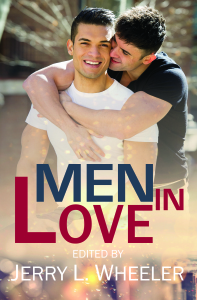 Hello again! It’s Sunday, so you know I’m going to get all crazy about short fiction again. Today I’ll be chatting about Bold Strokes Books’s anthology Men in Love: M/M Romance with one of the contributors, Richard Natale. Richard was a “new-to-me” author. As I’ve said often, one of the things I love the most about reading short fiction anthologies is exactly that: I get to meet new authors.
Hello again! It’s Sunday, so you know I’m going to get all crazy about short fiction again. Today I’ll be chatting about Bold Strokes Books’s anthology Men in Love: M/M Romance with one of the contributors, Richard Natale. Richard was a “new-to-me” author. As I’ve said often, one of the things I love the most about reading short fiction anthologies is exactly that: I get to meet new authors.
Spring approaches with the promise of new beginnings, fresh adventures, and the thrill of romance rekindled or discovered. Hot, sexy guys abound—meeting on the ball fields or the boardroom, at the theater or the classroom—falling in love and lust for the first time or celebrating a lifetime. Come join the rites of spring and indulge yourself in the passion and pleasures of our luscious men in love. Stories from some of today’s popular m/m romance authors explore the many faces of men in love: gay for you, seductions, weddings and more.
NB: Having perused your backlist, you write in a few different genres and styles (YA, romance, short fiction…) I meet a lot of authors who say one style or format “fits” them best, and the others are always more work. Do you have a favourite genre or format?
RN: Many writers believe they have one great novel in them. While I hope that will eventually be my case, but I would be content with one great short story. In fiction as in life, I don’t have a “type.” One day it’s dark and swarthy, the next day, tall and lithe. Short fiction allows me to slip in and out of a wide variety of skins. Many of my stories are about the infinitely complex nature of navigating love and commitment, particularly between two men. I read recently that to most of the world (the other 90 percent) same sex attraction is considered to be purely libidinal between men, and just a phase between women. Yet, even the most footloose and fancy free of my friends yearn for romance and commitment. Getting there, aye, that’s the rub. My non-glbt short stories deal with a wider variety of subjects, particularly the recent spate of stories I’ve written for Hollywood Dementia, most of which focus on career. My forthcoming novel, Rushes, deals with two gay twentysomethings trying to navigate career, friendship and relationships in contemporary Hollywood.
NB: I’m now picturing a “dark and swarthy” short story vs. a “tall and lithe” short story. Tell us a bit about your story in Men in Love. What was the lightbulb moment of writing the story?
RN: The light bulb for “The Seven Forty-Five” was the location. Using the Staten Island Ferry as the focal point of the cat-and-mouse seduction propelled the whole story forward. The outcome of the seduction and its effect on the main characters’ lives exploded out of that tension. Not even I saw what was coming.
NB: I do love when the flow sort of takes the reins from you (and it’s a beautiful story, by the way. A definite high point in the collection for me). What’s on the horizon for you that we should know about? Any new titles, recent titles, or projects in the pipeline?
RN: Besides my novel Rushes, I am working on a long-term project, of which “The Seven Forty-Five” is a mosaic piece. The novel disguised as short stories will trace GLBT romantic life in Greenwich Village from World War II to the present. The first story in the series, a two-parter called “In the Fall of Forty-Four,” has been accepted by Gertrude Press and will appear in mid-year. Another story, set in the early fifties, “Barbara’s Poetry Lesson” (yes, lesbians) is included in the current anthology Off the Rocks. The response to several of my past short stories from friends has been “I wanted the story to go on. You should turn it into a novel.”
NB: Oh yes. The plight of the short story writer.
RN: Easier said than done in some cases, though not impossible. In this collection, the characters in all the stories, recur in future stories either as protagonists or in supporting roles. My hope is to meld love, friendship and the evolving glbt narrative through the lives of these characters. Terry from In the “In the Fall of Forty-Four” makes an appearance in both “The Seven Forty-Five” and “Barbara’s Poetry Lesson.” Both George and Donald from “The Seven Forty-Five” will recur in other stories as will Barbara and her lover Adrian.
RN: More immediately, I’m finishing a short story collection Holidays and Other Special Occasions, each of which centers on a particular holiday (Christmas, Mother’s Day) or special occasion (Graduation, Wedding) but in unconventional ways. “Tidings of Good Cheer” (Xmas) and “Mullen” (Valentine’s Day) have already appeared in Wilde Oats and “The Benefits” (Wedding) will be published in July in the MCB Quarterly.
NB: I’m in love with that sort of cross-over linked short fiction. I love finding series of shorts like this, and a collected volume? Heaven. Thank you!
You can get Men in Love: M/M Romance from Bold Strokes Books directly here, or check Indiebound for your local brick and mortar store. Or ask for it wherever quality LGBT books are sold.
 Richard Natale is a Los Angeles based editor and writer whose short stories have been published in a wide variety of literary publications including Gertrude Press, MCB Journal, Chelsea Station Magazine, Wilde Oats, Hollywood Dementia and the anthology Off The Rocks. His most recent novel is Love on the Jersey Shore from Bold Strokes Books which also published his previous efforts Junior Willis and Cafe Eisenhower, the recipient of an Honorable Mention from the Rainbow Book Awards in 2015. Additionally, his young adult novel, The Golden City of Doubloon, was published by Double Dragon Books.
Richard Natale is a Los Angeles based editor and writer whose short stories have been published in a wide variety of literary publications including Gertrude Press, MCB Journal, Chelsea Station Magazine, Wilde Oats, Hollywood Dementia and the anthology Off The Rocks. His most recent novel is Love on the Jersey Shore from Bold Strokes Books which also published his previous efforts Junior Willis and Cafe Eisenhower, the recipient of an Honorable Mention from the Rainbow Book Awards in 2015. Additionally, his young adult novel, The Golden City of Doubloon, was published by Double Dragon Books.


June 13, 2016
Teach
Back when I worked at the gay and lesbian centre in University, I was one of the two “outreach” co-ordinators. The other half of what was supposed to be a duo had to leave the position during my time, and there was a stretch where, although we always tried to give discussions as duos from among the various volunteers, sometimes I ended up doing them alone. I never minded, public speaking was an enemy I’d fought off successfully.
At one of the discussions where I was alone, all I knew was I was going to be speaking with “teachers and related staff.” I brought my usual discussion pattern, not knowing what grades I was speaking with, and what level of knowledge they’d be coming with.
It turned out to be a group of teachers, guidance counsellors, and the principal of a Catholic school board school. They’d been “voluntold” to go to this discussion group. The vice-principal had refused, if I’m remembering correctly. It was, without a doubt, the most hostile room I’ve ever walked into to speak on two fronts—one, from those who disagreed with my “lifestyle,” and two, from those who believed it a pointless message, as if they followed the teachings of their faith, they would never treat me differently. It was, to put it mildly, a chilly reception.
I always introduced myself, gave a background about the centre, and then asked for a “parking lot” of questions in-advance, so I could figure out what people wanted to know. That went okay, if without much enthusiasm.
Then I started to define my terms. The moment I said “homophobia” a man’s hand shot up. and he started speaking.
“That word is stupid. It means fear. I’m not afraid of gay people.”
Rumbles and grumbles made it clear that others agreed. So I halted, looked down at my notes, and remembered a discussion I’d heard once.
“Okay,” I said. “Let’s talk about that. But let’s step away from the gay thing first. Let’s talk arachnophobia.”
A few frowns, but they seemed willing.
“I’m going to ask you to put your hands up if you’d say you’re an arachnophobe.”
A bunch of people put up hands. More than half, I’d say. And, to illustrate the point, so did I.
“Now, a phobia is an irrational fear, which I think we can all agree to, right?” Again, the room seemed willing. “So, if you have a legitimate reason to be afraid of spiders, drop your hand. I mean, if you’re allergic, or you woke up covered in spiders when you were a kid, or something like that, then there’s a reason you have this fear, and that stops being a phobia and starts being a rational reaction or a trauma.”
Someone lowered their hand, and I remember joking, “Please never tell me that story.” A couple of people laughed, including that person, which was good.
“Okay, now, those of you with your hands up in the air, drop your hands if you’ve never swatted or smushed a spider.”
A few hands went down.
“Now, I’m going to ask you to put your hands back up if you’re doing so on a technicality—did you get someone else to smush the spider?”
One hand went back up.
“Okay, so, here’s the thing: Do you think it matters to the spider what word we use?”
I could tell the guy was not happy with that answer, so I went on.
“I’m going to use the word homophobia, but if it makes you feel better, when I say the word, imagine what I’m saying is, ‘people who’d rather the gay kid not exist, by whatever means that might be.’ I didn’t even cover the arachnophobes who are ‘kinder’ and just take those spiders and throw them outside somewhere. The ones who are okay with spiders, just not where they can see them, and not in their house.”
By this point, people were shifting in their seats, visibly uncomfortable.
At the end of what still stands as my worst homophobia workshop ever, that guy with the problem about the terms came up to me and repeated himself. He wouldn’t use the word. Not ever. It was a stupid word. I’m absolutely sure I did not reach that man in any way. But when I got the feedback slips at the end of the night, more than a couple of the pieces of paper mentioned the “arachnophobia thing” and how it helped them see things a bit differently.
When I think of hate crimes like what just happened in Florida, I always go back to that room and that discussion group, and I remember how in a room full of people who absolutely didn’t want to hear what I was about to say, there was that one guy, up front, saying loudly that he didn’t like the terms I wanted to use to even begin the discussion.
People will always attempt to derail the conversation. They will nitpick terms, and trip up conversations with tiny details. They will look for loopholes, and exceptions, and just like “I Don’t Think Like That,” “Not All Men,” and “Not a real Christian,” it will often come from a place where someone who truly does wish nothing but the best for queerfolk will feel like they’re being painted by the same brush decrying the homophobia, misogyny, transphobia and racism at play.
The victims will still be dead.
And if you’re feeling overwhelmed? You don’t have to hurt yourself to help another. Take a breath. Step back. We may be a weird and fucked-up and barely functional community a lot of the time, and as prone to our own trouble from within as without, but until you’re in a place where you can speak your truths, take care of yourself. Self-care matters. I know when even our safe spaces aren’t safe, when the hate comes inside the very places we count on to feel secure, that it’s devastating.
If you can, keep talking. If you can, keep donating your time, your effort, whatever you can. Keep trying. Keep voting. Keep speaking so the ones watching the conversation—not the ones who you know full well have zero intention of ever changing their minds—might hear another point of view.
The irrational fear was learned.
Teach something else.


June 12, 2016
Sunday Shorts – “Not Just Another Pretty Face” Q&A with Mark Ward
 Today I’m going a bit off the usual path for Sunday Shorts and speaking with Mark Ward, who wrote a short piece for Not Just Another Pretty Face. Why is that unusual? Well, Mark wrote a poem, and this is my first chat about a poem here on the Sunday Shorts series.
Today I’m going a bit off the usual path for Sunday Shorts and speaking with Mark Ward, who wrote a short piece for Not Just Another Pretty Face. Why is that unusual? Well, Mark wrote a poem, and this is my first chat about a poem here on the Sunday Shorts series.
I have zero poetic gift. Zero. I love poetry, and admire those who can say so much with so little, and to me, that makes it short enough to count.
So welcome to Mark, and I hope you’ll join us for a chat.
Twenty-three photos of male go-go dancers become the basis for stories, poems, essays, and drama by twenty-seven authors, revealing unexpected mysteries, romance, fantasy, and humor. Contributors include 2015 Sue Kaufman Prize winner Michael Carroll, 2013 Lambda Mid-Career author Trebor Healey, and Lammy winners Jeff Mann, David Pratt, and Jim Provenzano.
NB: Not Just Another Pretty Face had the unique factor of starting from a picture prompt. Was that unusual for you? Where do your normal writing ideas “spark” from?
MW: Hi Nathan! Thanks for having me on Sunday Shorts! I’ve always been drawn to prompts and/or anthology calls, especially for poetry (which seems to be much less common than fiction). When I came across the call for Not Just Another Pretty Face, I got in contact straight away and was given a bunch of photographs to peruse. Immediately, one jumped out at me and the poem almost wrote itself (I love when that happens). I’ve written other things from prompts—my poem Mongrel was from a prompt, and I try to write a poem each month for Rattle’s Ekphrastic challenge. It’s a good way to widen your scope, and also change up what you’re writing.
NB: Ekphrastic is a word I learned thanks to this anthology. (You can read the definition here, but it basically means a creative piece of prose inspired by or describing an image.)
MW: Regular writing ideas can spark from anywhere. One of my recent poems, (Gown, published on The HIV Here + Now Project) was very autobiographical and came from a hospital visit I had. A long performance poem of mine, Blue Boy, came from the title (There was a band called Blue Boy which had a minor hit called Remember Me and that song was stuck in my head that day. The poem has nothing to do with the song however!). For the past few years, I’ve been working on a huge project called American G.I. It’s a trilogy of novels in verse. I’m working on the first one at the moment, Circumference. The whole project was sparked from a single image in a docudrama I saw many years ago called A Very British Sex Scandal. It was about Peter Wildeblood whose experiences led to the Wolfenden Report and the decriminalization of homosexuality in the UK. In it, there’s a scene where he picks up an American GI outside a tube station. Years later, I saw a call for a lit mag about pulp era figures, that image popped into my head and when I wondered who the GI was, the book was born.
Some ideas, however, come from really odd places—I recently wrote a basic outline for a future novel that was inspired by a jumper my father bought me!—whilst others things, like the romance novel I’m working on at the moment (under my pseudonym, Chris Colby), I’ve no idea where the idea came from, it just appeared!
NB: I love the all-to-rare “spring from the head fully formed” moments. Also, I want to see the jumper. You mentioned your pseudonym (who also appeared on this series for a short story chat) and novel-writing. Now, another facet of Not Just Another Pretty Face is the collecting of poetry, prose, nonfiction and a play in one volume. The crossover between writing styles and genres isn’t something you often come across – what do you hope a reader coming to your piece who might be used to a different genre might find?
MW: I love that there’s a mix of forms in the anthology. It allows the initial reaction to the image and the creative spark to be unconstrained and take whatever form it wants. My poem, Yggdrasil, is quite surreal and hopefully it will be something different from the fiction around it. For those who normally exclusively read fiction, it might be interesting to be presented with poems, perhaps for the first time since school, to engage with. Also, as you said, one of the great things about this anthology is the mix of writing genres which will encourage readers to explore genres they mightn’t be used to – not just poetry or playwrighting, but also photography (or writing, full stop – perhaps the anthology will have photography enthusiasts exposed to lots of different types to writing for the first time!). Finally, there are some amazing writers included in this anthology! I was honoured to be included in this anthology alongside writers who I’ve read for years like David Pratt (whose book Bob the Book you should all read) and Raymond Luczak.
NB: Bob the Book was fantastic, yes. And I have to agree about the company we’re keeping: it’s a great feeling. What’s next from you? What should we be on the lookout for?
MW: I’ve recently had a long poem, Armature, featured in Matt Bright’s anthology The Myriad Carnival and my first short story as Chris Colby was featured in his other anthology, Threesome: Him, Him and Me. Currently, I’ve finished a chapbook that I’m very proud of called How to Live When Life Subtracts which I’m looking for a publisher for, and I’m working away on Circumference as well as some new poems. I’m also writing an as-yet-untitled romance novel set in Texas about a computer programmer and a private detective.
NB: Good lord. I feel like such a slacker right now. Thank you (I think)!
You can find Not Just Another Pretty Face at Beautiful Dreamer Press here, or check with your nearest brick-and-mortar store. Or, of course, ask for it wherever quality LGBT books are sold.
 Mark Ward is a poet from Dublin, Ireland. He was the 2015 Poet Laureate for Glitterwolf and his work has appeared in Assaracus, Tincture, The Good Men Project, HIV Here & Now, Off The Rocks, The Wild Ones, Emerge and the anthologies, Out of Sequence: The Sonnets Remixed, The Myriad Carnival and Not Just Another Pretty Face. He has recently completed his first chapbook, How to Live When Life Subtracts, and is currently working on a novel-in-verse called Circumference. As Chris Colby, he was included in the anthology Threesome: Him, Him and Me and is currently working on his first novel.
Mark Ward is a poet from Dublin, Ireland. He was the 2015 Poet Laureate for Glitterwolf and his work has appeared in Assaracus, Tincture, The Good Men Project, HIV Here & Now, Off The Rocks, The Wild Ones, Emerge and the anthologies, Out of Sequence: The Sonnets Remixed, The Myriad Carnival and Not Just Another Pretty Face. He has recently completed his first chapbook, How to Live When Life Subtracts, and is currently working on a novel-in-verse called Circumference. As Chris Colby, he was included in the anthology Threesome: Him, Him and Me and is currently working on his first novel.


June 10, 2016
An Open Letter to the Stanford Victim from a Fellow Survivor
I’m boosting this for many, many reasons, not the least of which is all the points herein strike a chord: we often talk about all the wrong things, even when our intent is to help. Believe. Listen. Help.
[Content Warning: The following open letter discusses sexual assault, rape/rape culture, and the Brock Turner case.]
Dear Stanford Victim,
I may not know you, but I do know what it’s like to be you. And I hope this message finds you, wherever you are.
I’m writing this letter, from survivor to survivor, because I’ve found myself upset and angry over all of the articles, posts, and comments I’ve seen on social media since the verdict in your case was announced. Although I am thankful that a dialogue has begun, and I know that people are outraged and emotional and have good intentions by sharing articles and things written by and about Brock Turner and his allies in order to cut them down, I am disappointed that it’s still Brock’s story that is shaping the narrative and not yours. Even though there are many who support you and have spoken…
View original post 1,400 more words


June 6, 2016
Starting the reading season right
How much do I love Jenn Burke? A small tonne, I’d say…
I read all year ’round, but there’s something about sitting in the sunshine with a book—whether on the beach or on the patio—that’s just so awesome. Since I started reading ebooks a few years back, I’ve used a tablet, but I decided this year, I wanted to do more reading outside, so for Mother’s Day, Hubby and the kids got me a Kindle Paperwhite. So far, I’m loving it. I didn’t think the e-ink would be that much easier on the eyes, but wow.
Anyway, over the past month, I’ve read some great books. Check them out…
Triad Blood by ‘Nathan Burgoine
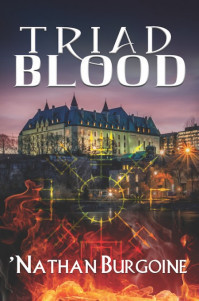
This is the first full-length novel featuring ‘Nathan Burgoine’s paranormal triad: Luc the vampire, Anders the demon, and Curtis the wizard. In this world, paranormal creatures must form groups of three (or more) in order to be safe from other creatures, and those groups are usually of one…
View original post 1,482 more words







